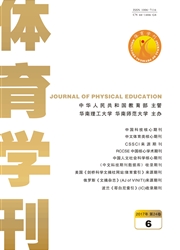

 中文摘要:
中文摘要:
基于血清代谢组学和定量差异探讨2型DM大鼠的运动干预机制。Sprague dawley大鼠分为正常对照组(NC)、DM模型组(DMC)和DM运动干预组(DME)。DMC和DME组大鼠予以高糖高脂饲料喂养4周,以40 mg/kg腹腔注射链脲佐菌素造模稳定1周。DME组大鼠实施游泳运动干预8周。采用超高效液相色谱-四级杆飞行时间质谱联用仪(UPLC/Q-TOF MS)技术对不同组别大鼠的血清进行代谢组学分析,利用定量差异对代谢组学获得的生物标记物进行筛选。结果显示:1)DME组、DMC组和NC组的血清代谢谱明显分离,表明DME组血清代谢谱与DMC组和NC组之间有显著的变化;2)血清中精氨酸、脯氨酸-甜菜碱、二十碳五烯酸、亚麻酸、丙基肉碱、单甘油酸酯(24:6)、肉毒碱、1-磷酸鞘氨醇、葡糖酸、和磷酸胆碱(20:3)共10种代谢产物在DMC组和NC组间存在显著性定量差异(l〉0.80),除了单甘油酸酯(24:6)和磷酸胆碱(20:3)外,8周游泳训练可以将DME大鼠体内的其它8种物质恢复到与NC组没有显著性差异(l〈0.47)。结果表明:(1)游泳训练可以完全康复2型DM大鼠。(2)多不饱和脂肪酸和精氨酸代谢有望成为今后研究运动干预2型DM机制的新鲜靶点。
 英文摘要:
英文摘要:
In order to probed into the mechanism of exercise intervention on type 2 diabetes mellitus (DM) rats based on serum metabonomics and quantitative difference, the authors divided Sprague Dawley rats into a normal control group (NC), a DM control group (DMC) and a DM exercise group (DME), fed the rats in groups DMC and DME with high-sugar high-fat feed for 4 weeks, and intraperitoneally injected them with streptozotocin at a dose of 40 mg/kg body weight for 1 week in order to stabilize model establishment, implemented swimming intervention on the rats in group DME for 8 weeks, carried out a metabonomic analysis on the serum of the rats in different groups by using ultra performance liquid chromatography coupled with time-of-flight mass spectrometry (UPLC/Q-TOF MS), screened biomarkers acquired from the metabonomic analysis by utilizing quantitative difference, and revealed the following findings: 1) there was a clear separation of serum metabolic profile of the rats in groups DME, DMC and NC, indicat- ing that there was a significant change in serum metabolic profile between the rats in group DME and the rats in groups DMC and NC; 2) between the rats in groups DMC and NC, there was a significant quantitative difference in Arginine, Proline betaine, Eicosapentaenoic acid, Linolenic acid, Propionyl-L-carnitine, MG(24:6), Carnitine, Sphingos-ine-1-phosphate, Gluconic acid and PE(20:3)(l〉0.80), except MG(24:6) and PE(20:3) were completely recovered after 8-week exercise intervention(l〈0.47). The said findings indicate the followings: 1) swimming training can fully rehabilitate type 2 DM rats; 2) polyunsaturated fatty acid and arginine metabolism are hopefully to become new targets of study of the mechanism of exercise intervention on type 2 DM in the future.
 同期刊论文项目
同期刊论文项目
 同项目期刊论文
同项目期刊论文
 期刊信息
期刊信息
